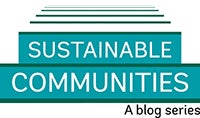All climate action is ultimately local. At the center of this is city leadership and engaged citizens. It is estimated that cities are responsible for 2/3 of global energy consumption and produce 80 % of the world’s GDP. Density creates the possibility of doing more with less, and with a smaller carbon footprint. While urban areas are responsible for more than 70 % of global energy-related carbon dioxide emissions, it is cities that can make a difference by effectively tackling climate change. We often find that cities lead the way on climate action against the inertia of national governments.
We already see a large number of cities taking the lead in sustainability through innovative financing mechanisms, technological advances, policy and regulatory reforms, efficient use of land and transport, waste reduction, energy efficiency measures, and reduction of GHG emissions.
What is needed now for scaling this up is systematic knowledge exchange and learning among cities. Peer-to-peer learning is a powerful tool once contextualized and adapted to the particular socio-economic and political context. Iterative learning with feedback loops can help in finding transformative solutions.
Sometimes, simple measures can make a big difference. For instance, the “Mayors Task Force on Climate Change, Disaster Risk and the Urban Poor” was created after COP 15 in Copenhagen. It was facilitated by the World Bank, and consisted of Mexico City, Jakarta, Dar es Salaam, and Sao Paulo. The cities created a peer to peer network and exchanged their experience on resilience - the importance of empowering local communities, engaging citizens, incorporating resilience into urban planning, strengthening institutions, finding innovative financing mechanisms and how critical it was for national, state, and city level policies to be aligned.
What we know today is that knowledge and learning with regard to climate action is important and needs to be accessible just-in-time. The World Bank’s Open Learning Campus (OLC), launched in January 2016, is a platform and ecosystem for accelerated learning. We have a number of e-courses on key development challenges such as climate change, low carbon development, and sustainable development. Our Massive Open Online Course (MOOC) “Turn Down the Heat: Why a 4 degree centigrade Warmer World Must be Avoided” is available both in English and Spanish.
The C40 Cities Network plays a key role as a convener for peer-to-peer learning on climate change. It leverages climate action in currently 83 affiliated cities, enabling them to connect with each other and share technical expertise and best practices. I was proud to be in Paris as part of the jury panel for the C40 Cities Awards, which were held to coincide with COP21.
As we deliberated on the submissions from cities around the world, I was impressed by the determination, ingenuity, foresight, creativity, and commitment of each of these cities to help fight climate change and create a better life for their citizens. It was a tough decision for the jury since the top submissions were very competitive. Finally the awards went to 10 cities, for a high level of environmental success, replicability and scalability.
The one message the cities delivered loudly and clearly at the award ceremony was that learning from each other and sharing lessons was key.
We already see a large number of cities taking the lead in sustainability through innovative financing mechanisms, technological advances, policy and regulatory reforms, efficient use of land and transport, waste reduction, energy efficiency measures, and reduction of GHG emissions.
What is needed now for scaling this up is systematic knowledge exchange and learning among cities. Peer-to-peer learning is a powerful tool once contextualized and adapted to the particular socio-economic and political context. Iterative learning with feedback loops can help in finding transformative solutions.
Sometimes, simple measures can make a big difference. For instance, the “Mayors Task Force on Climate Change, Disaster Risk and the Urban Poor” was created after COP 15 in Copenhagen. It was facilitated by the World Bank, and consisted of Mexico City, Jakarta, Dar es Salaam, and Sao Paulo. The cities created a peer to peer network and exchanged their experience on resilience - the importance of empowering local communities, engaging citizens, incorporating resilience into urban planning, strengthening institutions, finding innovative financing mechanisms and how critical it was for national, state, and city level policies to be aligned.
What we know today is that knowledge and learning with regard to climate action is important and needs to be accessible just-in-time. The World Bank’s Open Learning Campus (OLC), launched in January 2016, is a platform and ecosystem for accelerated learning. We have a number of e-courses on key development challenges such as climate change, low carbon development, and sustainable development. Our Massive Open Online Course (MOOC) “Turn Down the Heat: Why a 4 degree centigrade Warmer World Must be Avoided” is available both in English and Spanish.
The C40 Cities Network plays a key role as a convener for peer-to-peer learning on climate change. It leverages climate action in currently 83 affiliated cities, enabling them to connect with each other and share technical expertise and best practices. I was proud to be in Paris as part of the jury panel for the C40 Cities Awards, which were held to coincide with COP21.
As we deliberated on the submissions from cities around the world, I was impressed by the determination, ingenuity, foresight, creativity, and commitment of each of these cities to help fight climate change and create a better life for their citizens. It was a tough decision for the jury since the top submissions were very competitive. Finally the awards went to 10 cities, for a high level of environmental success, replicability and scalability.
The one message the cities delivered loudly and clearly at the award ceremony was that learning from each other and sharing lessons was key.



Join the Conversation